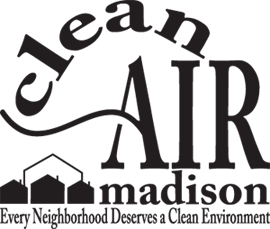Health Complaints About Kip Corporation
Since Kipp began its expansion and adding chlorine gas to its low-quality molten aluminum in 1990, neighbors have made hundreds of complaints, written and telephoned, to Wisconsin Department of Natural Resources. The City Public Health Department, area alders, and Kipp itself have also received complaints. These detail adverse health effects from exposure to constantly increasing Kipp chemical and metallic pollution, sleep-preventing noise (both roaring and continuous high-pitched whining), inability to use residential property because of fumes, intense industrial smells, and noise, and other stressful and life-altering effects, many of them extremely serious.
The chemicals used at this foundry cause: RESPIRATORY PROBLEMS such as sore throat, swollen throat, scratchy throat, sneezing, coughing, shortness of breath, rapid breathing, lung pain, sinus irritation, post-nasal drip, asthma, bronchitis and emphysema; EYE & EAR PROBLEMS such as irritated eyes, watery eyes, irritated nose, earaches and itchy ears; HEART PROBLEMS such as racing heartbeat, pounding heart, chest constriction and chest pain and constriction; OTHER symptoms such as nausea, vomiting, headaches, lightheadedness, disorientation, trouble concentrating, drowsiness, stomach cramps and diarrhea. MORE DANGEROUS LONG -TERM EFFECTS such as CANCER, LIVER DYSFUNCTION, KIDNEY DISEASE, OSTEOPOROSIS, ARTHRITIS, ALZHEIMER'S AND MUTATIONS IN FETUSES.
Some of the hundreds of complaints filed with Wisconsin Department of Natural Resources and the City Health Department since 1990 are:
1) A woman lived in the Schenk-Atwood neighborhood for 13 years without experiencing any physical problems. In the mid-1990s she became aware of strong unpleasant odors. She is concerned about these odors and their health effects; she knows of 6 other people with sinus problems that developed in this area between approximately 1991 and 1997.
2) Walking home from school with a child and the child's friend, a person walked down South Marquette Street from Atwood Avenue. Chlorine in the air was so intense that they all ran to get past the railroad tracks!
3) A person has rental property on Marquette Street. The vinyl siding on the house is marred with deposits which cannot be washed off with a power washer. The tenant has large particles on his car.
4) A woman who had never been bothered by the plant although she had lived nearby, south of it, for 23 years, complained. The last few days, there was a strong metallic odor and she could hardly breathe. Also twice at night she has seen visible emissions from Kipp's stacks. She also described tarnishing of silver that people have told her is characteristic of sulfur tarnishing.
5) The facility was contacted by a South Marquette Street resident in the afternoon of August 18, 1996. Resident reported a sulfur odor similar to the odor the last summer which was found to be due to a propane leak. Investigation the morning of August 19, 1996 found a small leak in the propane tank. (Lucky no one had a cigarette!) (The leak had gone unstopped for more than half a day.)
6) A person called to report that family had health problems. Son had a constant sore throat; mother lost a baby 2 years ago due to her "strange" blood disease. The family had had many sinus infections while living in the Kipp neighborhood.
7) A person stated smell was extremely bad at time of complaint. Her symptoms included nausea, chest pain, and pounding heart.
8) A couple stated that Kipp emissions had been so bad the previous night that they had had to leave their home to sleep.
The response of Kipp's owners and highest executives has been to deny that
there is any problem, to verbally attack, dismiss, or misrepresent neighbors
who have complained, and to have tests performed by consultants of Kipp's
own choosing tests whose premises and conclusions some neighbors consider
questionable which Kipp submits as "proof" that "there is no problem," despite
the huge number of complaints. Kipp has taken advantage of extremely loose
Wisconsin Department of Natural Resources interpretation of loopholes in
Wisconsin Natural Resources law, like calling dilution with water the "Latest
Available Control Technology" (LACT) to meet the pollution-control requirements
of Wisconsin law.
